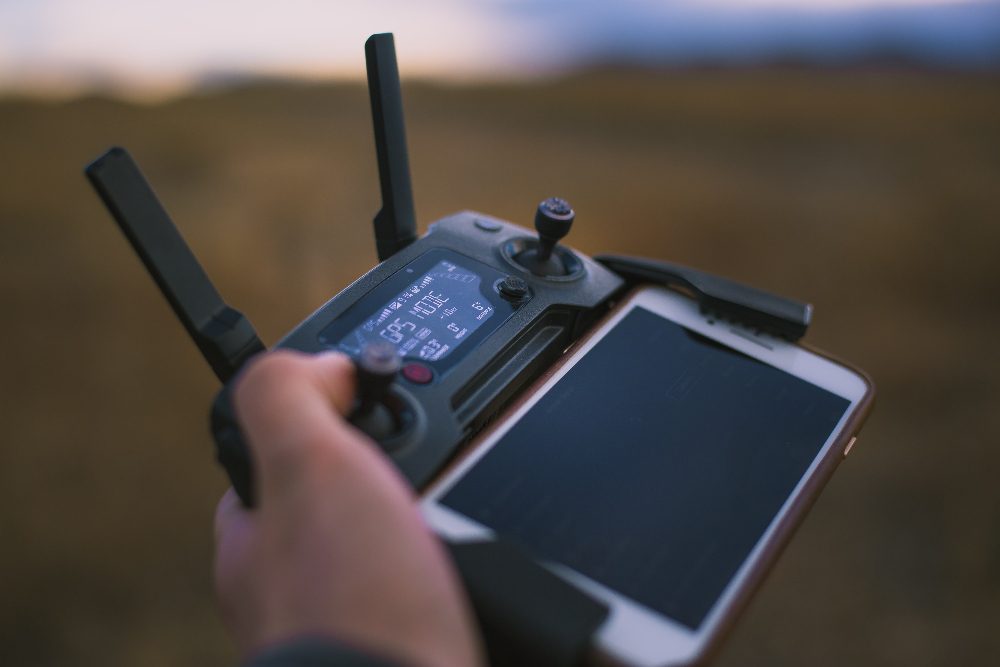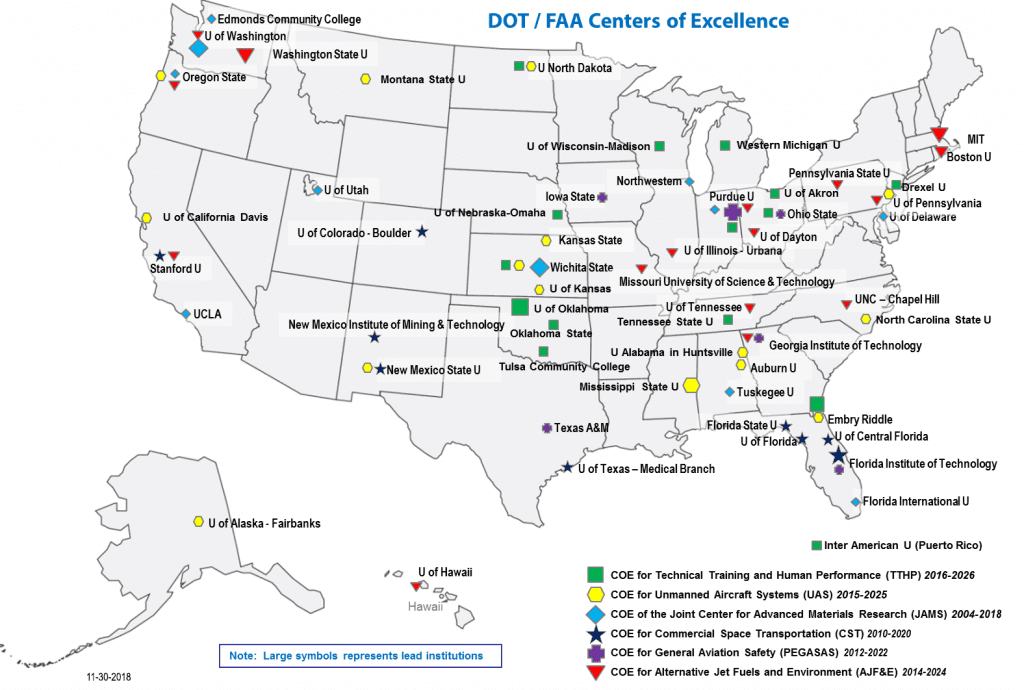As the UAS IPP winds down the FAA has been making some big moves with universities around the U.S.
U.S. Transportation Secretary Elaine L. Chao recently announced that the FAA has awarded $7.5 million in research grants to universities to investigate various aspects of how drones can be safely incorporated into the national airspace.
The FAA also recently announced the first 26 universities in its Collegiate Training Initiative (CTI), a program that allows educational institutions to collaborate with the FAA to help students pursue their aviation career goals.
About the UAS Collegiate Training Initiative (UAS-CTI)
If you’ve been thinking about pursuing a drone-related degree in college, the list of universities participating in the FAA’s new UAS-CTI program could be a good place to start your research.

The UAS-CTI is a program designed for universities, colleges, and technical schools to recognize institutions that prepare students for careers in UAS. It recognizes institutions that prepare students for careers in UAS, basically providing a vetted list of university drone programs for those looking to study drones at the collegiate level.
But the goal of the program isn’t just to help students find a good college drone program.
According to the FAA, one of the main objectives for the UAS-CTI is an ongoing partnership with universities to grow and continue fostering the drone ecosystem in the U.S.
The results of this collaborative working relationship will include a continuous dialogue with stakeholders to connect universities with general industry, local governments, law enforcement, and regional economic development entities to address labor force needs.
– The FAA
Here are the 26 schools the FAA has selected to participate in the UAS-CTI so far:
- Blue Mountain Community College, Pendleton, Oregon
- Central Oregon Community College, Bend, Oregon
- Dakota College, Bottineau, North Dakota
- Embry Riddle Aeronautical University, Daytona Beach, FL and Prescott, AZ
- Green River College, Auburn, Washington
- Gulf Coast Community College, Panama City, Florida
- Hazard Community and Technical College, Hazard, Kentucky
- Hinds Community College, Bolton, Mississippi
- Idaho State University, Poncatello, Idaho
- Indiana State University, Terra Haute, Indiana
- MiraCosta College, Carlsbad, California
- Mountain Empire Community College, Big Stone Gap, Virginia
- Mountwest Community and Technical College, Huntington, West Virginia
- Niagara Community College, Sanborn, New York
- North Carolina State University, Raleigh, North Carolina
- Northeastern Technical College, Cheraw, South Carolina
- Northland Community and Technical College, Thief River Falls, Minnesota
- Northwestern Michigan College, Traverse, Michigan
- Oklahoma City Community College, Stillwater, Oklahoma
- Palomar College District, San Marcos, California
- Santa Rosa Junior College, Windsor, California
- Southwestern College, Chula Vista, California
- Tallahassee Community College, Tallahassee, Florida
- University of Maine at Augusta, August, Maine
- University of North Dakota, Grand Forks, North Dakota
- WSU Tech, Wichita, Kansas
Fun fact—our Manager, Marketing & Inbound Sales Chase Flynn attended one of the programs on this list. In 2019 Chase received his Bachelor of Science in Aeronautics with a Minor in Unmanned Aerial Systems from Embry-Riddle Aeronautical University.
To learn more about the UAS-CTI visit this webpage on the FAA’s website.

How Schools Can Join the UAS-CTI
Schools that are interested in joining the UAS-CTI must meet the following qualifications:
- School type. Not-for-profit, two- or four-year, post-secondary educational institutions are eligible.
- Accreditation. Must be institutionally accredited by an agency recognized by the U.S. Secretary of Education.
- Degree/Certification. To be eligible, schools must currently offer a Bachelors or Associates degree in UAS; or a degree with a minor, concentration, or certificate in UAS. The FAA considers a degree viable only if it is active and students graduate with the degree or certification.
If you’d like to submit a request to the FAA to have your school become a UAS-CTI participant, send an email to [email protected] that includes:
- Name of your school
- Point of contact
- School type
- Accreditation
- Description of UAS degrees or certifications
If your school meets the eligibility criteria based on the information you send someone from the FAA will reply with an initial questionnaire to further establish eligibility for the program.
This document created by the FAA provides more information about the UAS-CTI, including additional information about how schools can join the program.
About the FAA’s University Drone Research Grants
The $7.5 million the FAA has awarded universities to conduct research about drones was made under the Air Transportation Center of Excellence (COE) for Unmanned Aircraft Systems (UAS), which is also called the Alliance for System Safety of UAS through Research Excellence (ASSURE).
This map shows all of the universities that serve as COE partners through the country:

Through ASSURE, 19 grants have been awarded for eight different projects, all related to integration UAVs into the national airspace.
This $7.5 million federal investment will fund university research on the safe integration of drones into our national airspace.
– U.S. Secretary of Transportation Elaine L. Chao.
Here’s an overview of the eight different projects that received funding:
1. Validation of Low-Altitude Detect and Avoid Standards
Award recipients:
- Mississippi State University—$1,500,000
2. Safety Risks and Mitigations for UAS—Operations On and Around Airports
Award recipients:
- University of Alaska, Fairbanks—$401,999
- Kansas State University—$220,000
- New Mexico State University—$320,000
- University of Alabama, Huntsville—$219,815
- University of North Dakota—$320,000
3. Science and Research Panel (SARP) Support
Award recipients:
- University of Alabama, Huntsville—$70,383
4. Identify Wake Turbulence and Flutter Testing Requirements for UAS
Award recipients:
- University of Kansas—$800,000
- The Ohio State University—$698,921
5. Urban Air Mobility (UAM): Safety Standards, Aircraft Certification and Impact on Market Feasibility and Growth Potentials
Award recipients:
- Wichita State University—$450,000
- Mississippi State University—$315,000
- North Carolina State University—$184,999
- Embry-Riddle Aeronautical University—$249,923
6. UAS Standards Tracking, Mapping, and Analysis
Award recipients:
- Embry-Riddle Aeronautical University—$264,900
- University of North Dakota—$235,000
7. Cybersecurity and Safety Literature Review
Award recipients:
- Oregon State University—$200,000
- New Mexico State University—$150,000
- University of North Dakota—$144,238
8. Validation of ASTM Remote ID Standards–Safety Research Center
Award recipients:
- Mississippi State University—$750,000
To learn more about each individual project, see this press release from the FAA.

